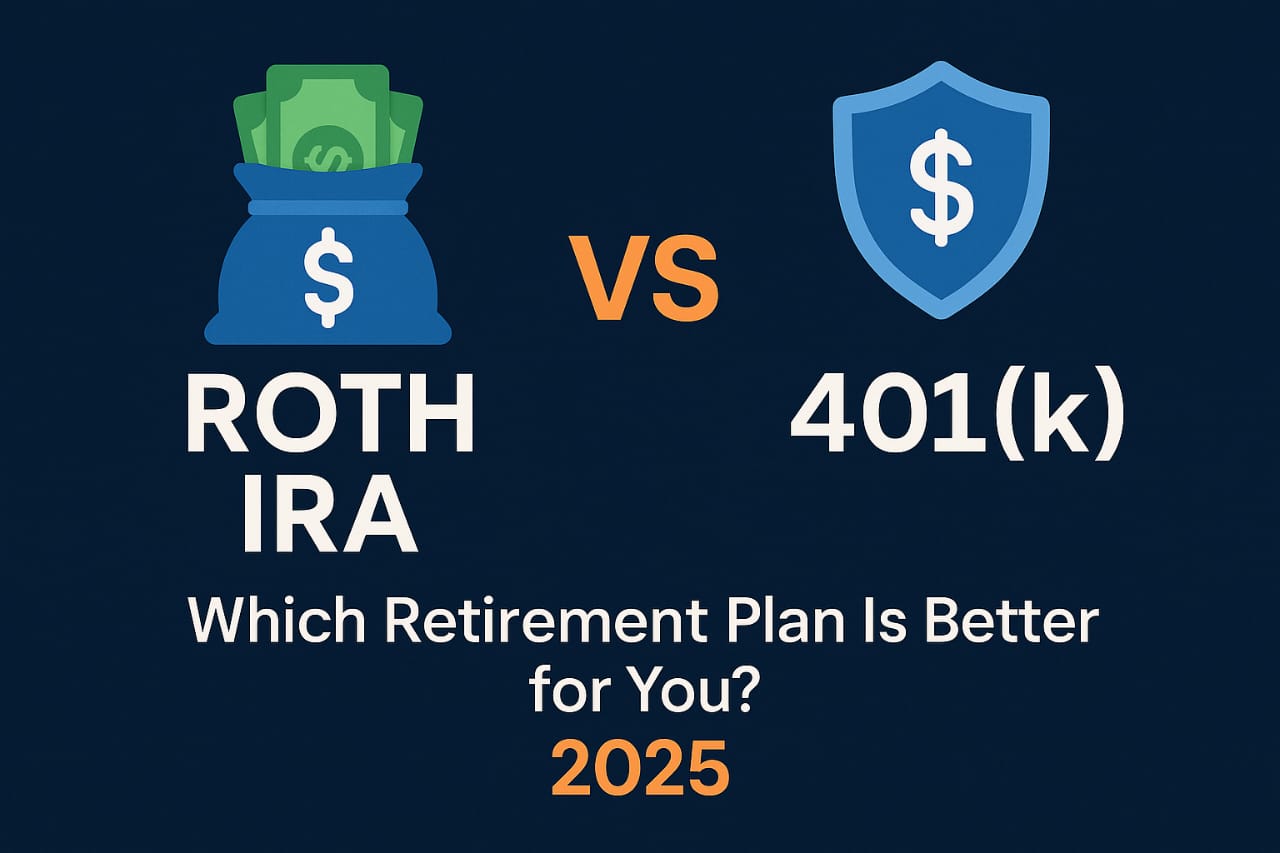
RA vs 401(k) in 2025 – Which Retirement Plan Is Better for You?
Retirement planning in the United States has always centered around two main options: Roth IRA and 401(k). In 2025, with changing income trends, tax brackets, and inflation, making the right choice between these two can significantly impact your financial future.
Let’s break down their features, benefits, and key differences to help you decide what suits your goals in 2025.
🔍 Quick Overview
Feature Roth IRA 401(k)
Tax Treatment Contributions are after-tax; withdrawals are tax-free Contributions are pre-tax; withdrawals are taxed
Contribution Limit (2025) $7,000 (under 50), $8,000 (50+) $23,000 (under 50), $30,500 (50+)
Employer Match ❌ Not applicable ✅ Often available
Withdrawal Rules Tax-free after age 59½ & 5-year rule Taxed after 59½; early withdrawals penalized
RMDs (Required Minimum Distributions) ❌ Not required ✅ Required starting at age 73
🏦 What is a Roth IRA?
A Roth IRA (Individual Retirement Account) is funded with after-tax income. You pay taxes now, but the money grows tax-free and can be withdrawn tax-free after age 59½.
✅ Best For:
People expecting higher income in retirement
Young professionals in lower tax brackets
Those looking for long-term tax-free growth
💼 What is a 401(k)?
A 401(k) is an employer-sponsored retirement plan that lets employees contribute pre-tax dollars from their paycheck. Employers may also match a portion of your contributions.
✅ Best For:
Employees with access to a strong employer match
People in high tax brackets currently
Those looking to lower taxable income today
🔄 Roth IRA vs 401(k): Detailed Comparison
1. Tax Impact
Roth IRA helps in tax-free retirement withdrawals.
401(k) reduces your tax burden today, but you pay taxes in retirement.
2. Contribution Limits (2025 Update)
Roth IRA: $7,000 ($8,000 if 50+)
401(k): $23,000 ($30,500 if 50+)
So if you’re looking to invest more aggressively, a 401(k) offers higher limits.
3. Access & Control
Roth IRA gives you full control over your investments.
401(k)s are controlled by your employer’s chosen plan provider and limited options.
4. Employer Match
401(k) plans offer free money via employer match. Not taking advantage of this is leaving money on the table.
5. Withdrawal Flexibility
Roth IRA allows withdrawal of contributions anytime (not earnings).
401(k) has strict withdrawal rules; early withdrawals are penalized unless hardship exemptions apply.
🤔 Which One Should You Choose in 2025?
Choose Roth IRA if:
You’re self-employed or have no employer-sponsored retirement plan
You expect higher income or tax rates in the future
You want more flexibility and tax-free growth
Choose 401(k) if:
Your employer offers a match (always max it out first!)
You want to reduce your current taxable income
You plan to contribute a higher amount yearly
Pro Tip:
Use a combo strategy — contribute enough to your 401(k) to get the full employer match, then invest in a Roth IRA for tax-free retirement growth.
📈 2025 Strategy for Retirement Success
✅ Max out 401(k) if employer matches
✅ Invest $500–$600 monthly in Roth IRA
✅ Rebalance portfolio quarterly
✅ Diversify across ETFs, index funds, and dividend stocks
✅ Track your growth with free tools like Personal Capital or Empower
🙋 FAQ – Roth IRA vs 401(k)
Q. Can I have both a 401(k) and Roth IRA?
Yes. You can contribute to both, as long as you meet income eligibility for Roth.
Q. What if I change jobs?
You can roll over your 401(k) into a traditional or Roth IRA without penalties.
Q. What happens if I withdraw early?
Roth IRA allows withdrawal of contributions anytime, but not earnings. 401(k) early withdrawals come with penalties + taxes.
🧠 Final Thought
There’s no one-size-fits-all answer, but in 2025, with higher contribution limits and smarter tax planning tools, you can combine both plans for powerful long-term wealth.
Choose smart, invest early, and let compounding do the rest 💸





